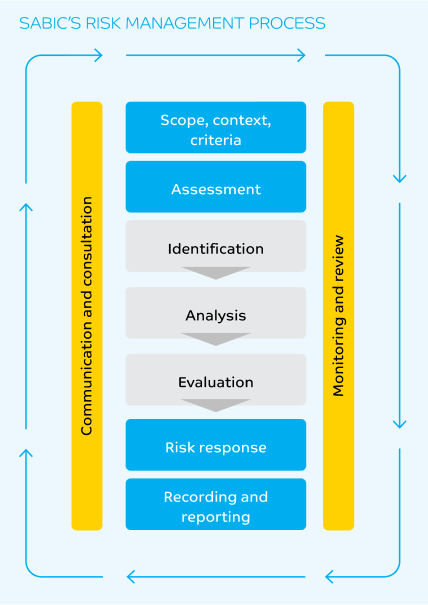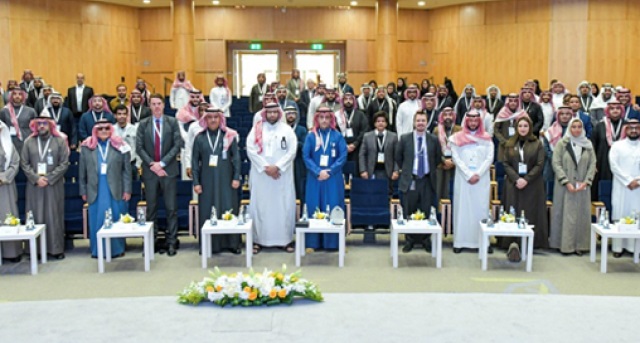Risks and Opportunities
Our risk management processes allow us to mitigate threats affecting our business and leverage opportunities to pursue strategic goals.
ENTERPRISE RISK MANAGEMENT AND GOVERNANCE
Enterprise Risk Management (ERM) at SABIC plays an essential role in employing an inclusive risk management and business continuity approach. This includes identifying risks, working through resilience phases with all stakeholders to understand potential risks, and mitigating risks before they occur or reducing their effects when they occur. ERM also works to secure the resilience of critical infrastructure to ensure business continuity in the provision of essential products and services.
SABIC has an established risk management policy and an integrated governance system. SABIC’s risk management process is based on the guidelines provided by ISO 31000. Its goals are to effectively identify, understand, and manage the threats facing the company and affecting our business performance as well as to leverage opportunities for pursuing our strategic goals. It also aids in setting appropriate risk appetite risk limits and controls, and monitoring/reporting rhythms to enable our business units and corporate functions to achieve their objectives.

SABIC pursues its strategic goals to maximize shareholder value through taking calculated risks in accordance with the organization’s risk management framework. The ERM department supports SABIC’s management by providing early warning of potential and emerging risks arising from internal or external events, which could impact the achievement of the company’s strategic goals.
In 2023, ERM went through an extensive risk refresher exercise with the SABIC Leadership team and conducted both internal and external due diligence to refresh SABIC's top risks (i.e. risks that could impact SABIC’s long-term strategy within a 5–10-year horizon). This exercise was conducted in line with changing business dynamics and external factors.
RISK CULTURE AND EXCELLENCE
SABIC has a strong risk culture; we consider all our employees to be custodians of this culture and entrust them to adhere to our standards and risk mindfulness in executing SABIC’s strategy. We continuously aim to enhance the risk management awareness among all SABIC’s employees, which promotes their understanding, commitment, and empowerment to identify and manage risks. SABIC’s ERM, through its training and management standards and procedures, aims to develop a disciplined and constructive control environment in which all employees understand their roles and obligations. Regular (i.e., every three years) surveys are conducted for business units and corporate functions to assess risk management maturity and implement initiatives to advance risk maturity further.
Hosting the Institute of Risk Management Saudi Arabia and Bahrain regional event

In 2023, we hosted the Institute of Risk Management (IRM) Saudi Arabia and Bahrain regional event at SABIC headquarters in Riyadh. SABIC's hosting of this event demonstrated our leadership's commitment towards the importance of risk management at SABIC, especially for building resilience in the context of a volatile global energy market. This event is also part of our broader efforts in knowledge exchange and in championing risk management in the region. The event was attended by over 100 risk professionals, both external attendees and internal risk champions.
2023 RISK LANDSCAPE
In 2023, petrochemical companies faced intensified supply chain and energy cost risks due to geopolitical uncertainties and the global economic slowdown. Challenges included disruptions to feedstock supply, surging shipping costs, and labor shortages. Rising energy prices and heightened competition for resources further strained production costs.
EMERGING RISKS
SABIC continues to monitor the impacts of various global and geopolitical events as well as climate change and natural disaster weather events. Noteworthy issues of focus included the Russia-Ukraine war, China-Taiwan tensions, inflation impact on banks, Pakistan debt crisis, Gaza war, Türkiye and Syria earthquake, severe drought, wildfires in Hawaii, and floods in Europe. Additionally, recent advances in AI have the potential to pose unfamiliar risks to our business and operations. In each case, effective risk assessment is carried out to ensure business continuity and resilience.
The impact of global and regional conflicts during 2023 on supply chains is evidenced by the constraints on energy and goods supply and the disruption of major transportation routes, raising prices across the board. SABIC has developed response plans to minimize these impacts, which include updating inventory, considering alternative shipping routes, utilizing storage vessels, and activating swap deals.
Moreover, the Silicon Valley Bank (SVB) crisis was a serious event in 2023 with potential for significant consequences. In SABIC, we have evaluated and treated the SVB crisis as an emerging risk that could have a negative impact on our business and operations.
The instability in the Middle East also has the potential to disrupt SABIC’s supply chain. Interruption in the operations of the Suez Canal, the Bab el-Mandeb and the Strait of Hormuz, whether due to military action or heightened tensions, could lead to increase of transportation costs, longer delivery times, higher insurance premiums, and potential congestion at alternative ports.
RISK FACTORS
SABIC may face various inherent risks in the global oil, gas, and petrochemical industries, as well as risks related to compliance with existing and potential future regulations and opportunities related to environment, social, and governance (ESG). The impacts of these risks (i.e. threats and opportunities) are managed by considering and implementing various strategies and approaches. Some of these risk factors are not within the company’s control and could adversely affect our business and financial and operating results and conditions.
STRATEGIC RISKS
- Highly competitive industries
- Cyclical nature of the petrochemicals industry and market conditions
- Climate change
- Rapidly evolving regulations around sustainability and ESG
- Loss of market share for SABIC products
- Digital transformation and artificial intelligence
OPERATIONAL RISKS
- Talent management
- Disruptions of supply chain services
- Geopolitical instability and pandemic
- Ease of information technology
- Inherent process safety
- Projects under development
FINANCIAL RISKS
- Customer credit
- Foreign exchange
- Insurance policies
COMPLIANCE RISKS
- Intellectual property and technology licenses
- Disputes and/or litigation
- International trade controls
- Use and handling of SABIC’s materials and products
- Regional chemical regulations
Read more about our risks and opportunities and how we are responding to them.
Disclaimer: This abridged interactive version of the SABIC Integrated Annual Report 2023 is based on the original PDF report published on this website. In case of any discrepancy, the original PDF report will prevail.
